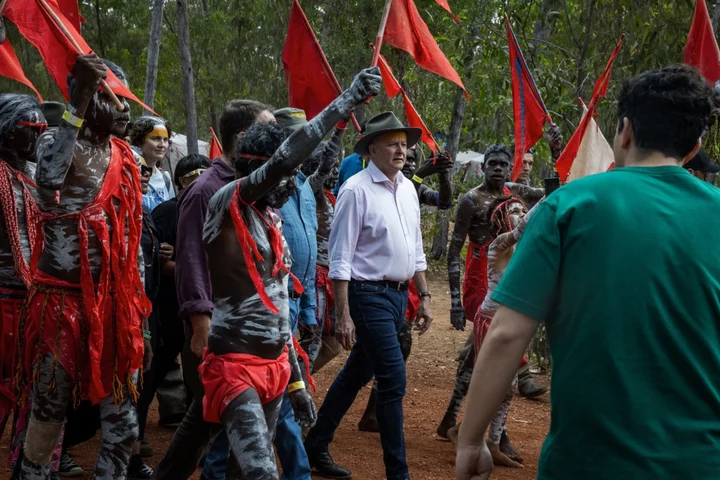Prime Minister Anthony Albanese wanted the biggest annual festival of Indigenous Australians to re-ignite his legacy-defining referendum on allowing them an advisory body to Parliament. But with just months of campaigning left, there’s growing concern the vote could fail.
Albanese used his weekend appearance at the Garma Festival in the Northern Territory to warn that campaigners against the Voice to Parliament, which he is promoting as crucial to lifting living standards for Indigenous Australians, were taking an “indefensible” position.
“This is a once in a generation opportunity,” Albanese told the Australian Broadcasting Corp. in an interview broadcast from Garma on Sunday. “A ‘No’ vote will be a vote for more of the same.”
Australia will vote by the end of 2023 on whether or not to embed an Aboriginal and Torres Strait Islander Voice to Parliament in the country’s constitution, which can only be amended through a referendum requiring a majority of votes along with a majority of support in the six states to succeed.
A survey by RedBridge published by News Corp. on Sunday found national support for the Yes campaign had dropped to 44% nationwide, with the No campaign ahead with 56% support. It didn’t provide details on how many people it surveyed or a margin of error.
The new advisory body would give parliament feedback on policies which affect Indigenous Australians, who suffer from lower life expectancy and higher incarceration rates than the rest of the population.
Read More: Why Australia Plans to Vote on an Indigenous ‘Voice’: QuickTake
Albanese said in the festival’s keynote speech that the compulsory vote wouldn’t be delayed or scrapped, while declining to confirm an exact date. He received a standing ovation following his speech from a crowd decked out in “Yes” campaign t-shirts.
A referendum failure would likely be more of a setback for Albanese than his government. The prime minister has put a lot of his personal political capital on the line to push the Voice ever since his Labor party was elected in May 2022. But support for the body has been flagging amid attacks from his main conservative political rivals who have said the plan lacks details, is divisive and won’t do enough to improve the lives of Indigenous Australians.
In interviews on the sidelines of the Garma Festival, several prominent Indigenous Australians reported rising racism in their communities as the campaign over the Voice to Parliament became louder and more heated. Marcia Langton, one of Australia’s best-known Indigenous activists and professor of Indigenous Studies at the University of Melbourne, said racist rhetoric was “through the roof.”
The Voice was important to tackle the “dire” outcomes for Indigenous Australians living in remote communities, Langton said, which includes high incidences of kidney disease, diabetes and respiratory diseases. One mayor of a small Indigenous community in far North Queensland said in an interview that out of 10 women who had died in his community recently, only three had been above the age of 45.
Langton said if the Voice referendum failed, it would be a major blow for Indigenous Australians.
“I doubt that there’ll be many people on our side of the fence who’ll be much interested in reconciliation,” she told Bloomberg.
Some of Australia’s biggest corporate leaders attended Garma as a show of support for Indigenous Australians and the Voice, including mining giant Rio Tinto Group. Speaking ahead of the festival, several business leaders including Business Council of Australia President Tim Reed rebuffed demands from the “No” campaign to remain neutral in the referendum.

